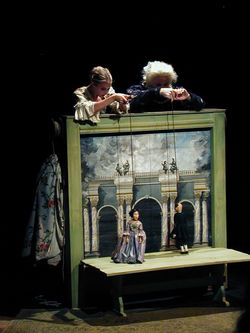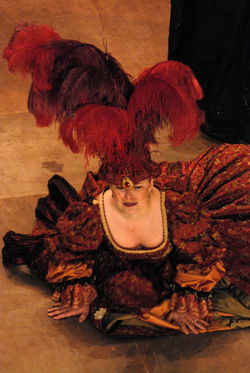Les Menus-Plaisirs du Roy
Musical direction: Jean-Luc Impe
Gigogne goes to war
But who invented the theatre?
Perhaps, without meaning to,
those who one day wanted to suffocate this child
in his cradle.
 Céline Scheen et PolichinelleCréation du spectacle "Gigogne" à Huy |  Céline Scheen et Patrick WaleffeCréation du spectacle "Gigogne" à Huy |  Catherine Daron, Jean-Luc ImpeCr�éation du spectacle "Giogne" à Huy |
|---|---|---|
 Céline Scheen et Patrick WaleffeCréation du spectacle à Huy |  Stéphanie GouillyNouvelle création de "Gigogne s'en va-t-en guerre" à Versailles. |  Stéphanie Gouilly et Vincent GoffinNouvelle création de "Gigogne s'en va-t-en guerre" à Versailles. |
 Céline ScheenCréation du spectacle à Huy |  Stéphanie GouillyNouvelle création de "Gigogne s'en va-t-en guerre" à Versailles. |  Nouvelle création de "Gigogne s'en va-t-en guerre" à Versailles. |
 Les Menus-Plaisirs du RoyNouvelle création de "Gigogne s'en va-t-en guerre" à Versailles. |
Faced with rebuffs and attacks from licensed theatres, fairground actors tried to survive at the start of the Age of Enlightenment.
By inventing or reinventing the most diverse acting techniques, by combining jargon or gromelo with pantomime, by resorting to puppets when the decrees of the Parliament of Paris had taken away their speech, by sometimes resigning themselves to signs, emblematic ancestors of silent cinema, by going to the Princes, only too happy to be the accomplices of this new form of subversion or by colluding with the Royal Academy of Music to obtain the right to sing vaudevilles, the entrepreneurs of the Saint-Germain and Saint-Laurent Fairs signed, in a few years, one of the most brilliant pages of the artistic and literary life of the 18th century.
Through the setbacks of a performance of Pierrot-Cadmus, constantly interrupted by the tribulations of the members of the company and the unexpected visits of the commissioners of the Chatelet, we will experience the droll and pathetic adventures of these new actors of Art. Finally, let us never lose sight of the fact that if censorship was cruelly felt under the Ancien Régime, it never completely disappeared; that if it is more policed in our contemporary societies, it remains present and subject to new dictates! Fashion and a certain fame offer new power to new cultural elites… which the latter are quick to exercise.